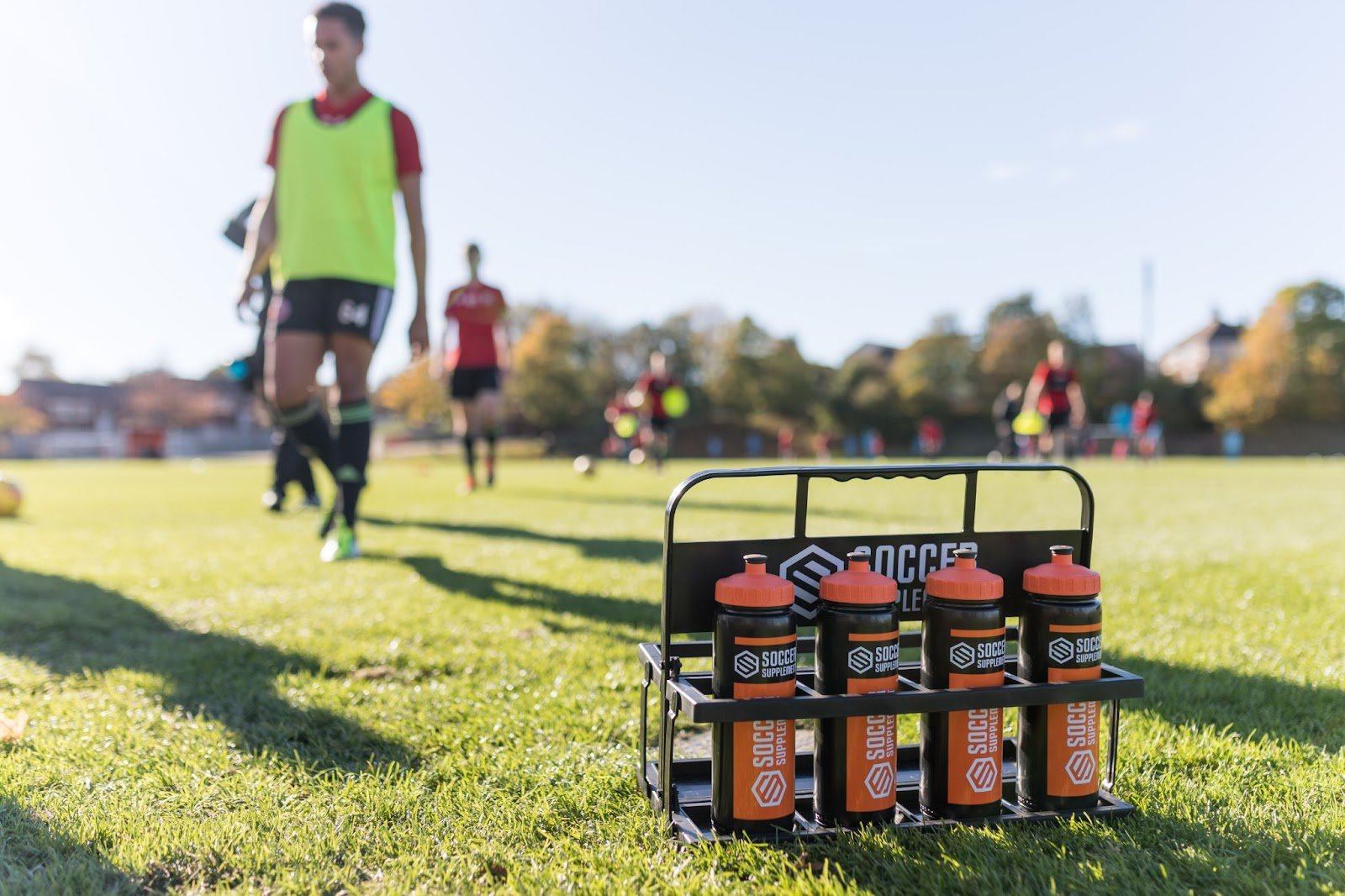amicitaacademy.com – For football athletes, nutrition plays a crucial role in enhancing performance, building strength, and speeding recovery. Given the sport’s high-intensity demands and long-duration matches, a well-rounded nutrition plan is essential. A footballer’s diet needs to provide energy, support muscle repair, improve endurance, and maintain overall health. Here’s a breakdown of standard nutrition guidelines that football athletes should consider.
1. Carbohydrates: The Primary Energy Source
Football is an intense, intermittent sport with high bursts of activity, making carbohydrates a crucial fuel source. Carbs are stored as glycogen in the muscles and liver, providing readily available energy during matches and training.
- Daily Intake: Football athletes should aim for about 5-7 grams of carbohydrates per kilogram of body weight on moderate training days, increasing to 7-10 grams on more intense or game days. For a 70 kg player, this means 350-490 grams of carbs daily.
- Sources: Whole grains (brown rice, oats, quinoa), fruits (bananas, berries), vegetables (sweet potatoes, spinach), and starchy foods (whole-grain pasta, potatoes) provide complex carbohydrates that offer sustained energy.
2. Proteins: Building and Repairing Muscle
Football requires explosive power, speed, and strength, so protein intake is essential for muscle repair, recovery, and growth. Protein also helps to maintain lean muscle mass and can reduce muscle soreness after intense activity.
- Daily Intake: Footballers generally need about 1.2-2 grams of protein per kilogram of body weight. A 70 kg player would aim for 84-140 grams per day. Intake should be spaced throughout the day, including post-exercise, to optimize muscle repair.
- Sources: Lean meats (chicken, turkey), fish (salmon, tuna), eggs, dairy products (milk, yogurt), and plant-based options (beans, lentils, tofu, nuts) provide high-quality protein.
3. Fats: Essential for Endurance and Energy Storage
While carbohydrates provide quick energy, fats are an essential source of energy, especially for prolonged activity. They also support brain function and help absorb fat-soluble vitamins like A, D, E, and K, which are important for overall health and injury prevention.
- Daily Intake: Athletes should aim for about 20-35% of their daily calories from healthy fats. For a player consuming 3,000 calories per day, this translates to about 67-117 grams of fat.
- Sources: Opt for healthy fats from avocados, olive oil, nuts, seeds, and fatty fish like salmon. Limit intake of saturated and trans fats, which can have negative health effects.
4. Hydration: Keeping the Body Optimally Fueled
Staying hydrated is essential, as even mild dehydration can impair performance. Footballers lose significant amounts of water and electrolytes (especially sodium) through sweat during training and matches.
- Daily Intake: Football athletes should aim for at least 3 liters (about 13 cups) of water per day, with additional intake during and after intense activities. During training, they should drink around 150-250 ml (5-8 oz) every 15-20 minutes to stay hydrated.
- Electrolyte Balance: After intense exercise, rehydrate with drinks that contain sodium and potassium, such as sports drinks or electrolyte solutions, to replenish lost minerals.
5. Micronutrients: Essential Vitamins and Minerals
Footballers require a variety of vitamins and minerals to support energy production, immune function, and muscle health.
- Iron: Vital for oxygen transport to muscles, especially important for endurance. Sources include lean red meat, spinach, beans, and fortified cereals.
- Calcium and Vitamin D: Essential for bone health, muscle function, and preventing injuries. Dairy products, leafy greens, and fortified foods are good sources, and sunlight exposure can help boost vitamin D levels.
- Magnesium and Potassium: These are crucial for muscle function and preventing cramps. Bananas, nuts, seeds, and leafy greens are rich sources.
6. Pre-Game and Post-Game Nutrition
Pre-Game Nutrition: Footballers should aim to fuel their bodies 2-4 hours before a match or intense training session with a balanced meal of carbs, proteins, and fats. A good example might include grilled chicken with brown rice and vegetables. Closer to the game (about 30-60 minutes prior), they may want a small snack, like a banana or an energy bar, for an extra boost.
Post-Game Nutrition: After a match or training, athletes need to focus on recovery. Ideally, they should consume a combination of protein and carbs within 30 minutes of finishing, followed by a balanced meal within a few hours. This helps restore glycogen levels and promotes muscle repair. A protein shake with fruit or a sandwich with lean meat and vegetables works well as a post-game snack.
7. Sample Daily Meal Plan for a Football Athlete
Breakfast: Oatmeal with berries, a handful of almonds, and a side of Greek yogurt
Mid-Morning Snack: A banana and a handful of mixed nuts
Lunch: Grilled chicken breast with quinoa, roasted vegetables, and a side salad
Pre-Training Snack: Whole-grain toast with peanut butter and sliced banana
Post-Training Snack: Smoothie with protein powder, a handful of spinach, a banana, and almond milk
Dinner: Salmon with sweet potatoes, steamed broccoli, and a side of mixed greens
Evening Snack: Cottage cheese with sliced berries or a handful of nuts
Conclusion
A well-rounded, balanced diet is essential for football players to meet the physical demands of the sport. Proper nutrition, hydration, and timing of meals can significantly enhance performance, reduce injury risk, and improve recovery. By focusing on a mix of complex carbs, lean proteins, and healthy fats, as well as maintaining hydration and micronutrient levels, football athletes can fuel their bodies for both intense training and game days.

